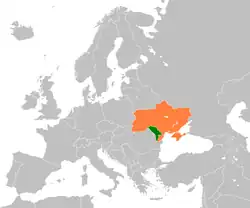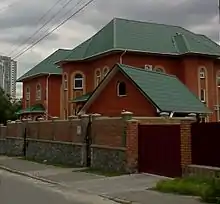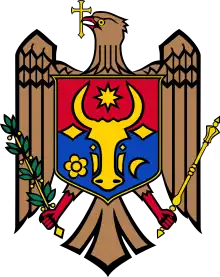 | |
Moldova |
Ukraine |
|---|---|
Moldova–Ukraine relations are the bilateral/diplomatic/foreign relations between the sovereign states of Moldova and Ukraine. The Moldova–Ukraine border is 985 kilometers (612 miles). Ukrainians are the third largest ethnic group in Moldova, behind Moldovans and Romanians. Both countries were former republics of the Soviet Union and are also the poorest countries in Europe. Both countries have applied for membership to join the European Union in 2022.
History
Early contacts
Close cooperation between the Central Rada of the Ukrainian People's Republic and the Sfatul Țării of the Moldavian Democratic Republic in November-December 1917 was evidenced by the fact that the first meeting of the Moldovan Parliament was held on November 21 , 1917 in Chisinau under the protection of "national Moldavian and Ukrainian troops." After the declaration of the independent Ukrainian People's Republic, its government, defining the state borders, paid special attention to that with Moldova.
Soviet era
Moldavian SSR |
Ukrainian SSR |
|---|---|
Ukrainian-Moldovan scientific relations reached a new level after the creation in 1946 of the Academy of Sciences of Moldova, as it was during this period that the connection between the Academy of Sciences of the Ukrainian SSR, allowed for the strengthening of Moldovan-Ukrainian cultural and scientific ties. In the 1980s, the efforts of Moldovan and Ukrainian ethnologists prepared the scientific collection "Ukrainian-Moldovan Relations in the Period of Socialism", which included developments in the history of Moldovans in Ukraine and Ukrainians in Moldova.
Post-independence
Ukraine recognized the independence of the Republic of Moldova on December 21, 1991. Diplomatic relations between the Republic of Moldova and Ukraine were established on March 10, 1992. The first official visit of the President Leonid Kravchuk to Moldova took place on October 23, 1992. During the visit of the "Treaty of Good Neighborliness, Friendship and Cooperation between Ukraine and the Republic of Moldova" was signed.[1]
In 2001, the two countries founded the Organization for Democracy and Economic Development (GUAM), along with Georgia and Azerbaijan.
21st century and Transnistria conflict
Ukraine, step by step after 2005, conceded several important economic privileges to Moldova. Kyiv accepted gas delivery to Moldova for the account of the Ukrainian share in the beginning of 2006 and electricity delivery at low tariffs. Ukraine has also accepted the introduction of the monitoring commission of the European Union at the Ukrainian-Moldovan border, as well as implementation of the unified customs procedure for the Transnistrian part of the Moldovan border. Ukraine opened its alcohol market for Moldovan production when Russia imposed a ban on it.
Nevertheless, certain areas remain with unsolved problems. Since 2006 Moldovan authorities have not delivered to Aerosvit the authorisation to operate daily flights to Chișinău. The rail transport remains an important issue, as Ukraine is constructing a new railway line to deviate from the problematic Transnistrian sector, with its frequent blocks of railway transportation. Moldova has not yet transferred to Ukraine the Odesa–Reni highway section, as well as bordering property in the region of Palanca.
Palanca is a marshy area that could become a Vennbahn-type enclave of Moldova surrounded by Ukraine. Under a 2001 treaty between the two nations, Moldova is to transfer to Ukraine not only the asphalt (as it has already done), but also the real property under 7.7 kilometers (4¾ miles) of road (which is a portion of the 300 km; 200 mile road between Odesa and Reni), and to clarify the sovereignty of that land, which under that treaty is to be transferred to Ukraine.[2]
The situation remains unresolved with one block of the Cuciurgan power station, as it considered to be on Moldovan territory today for unclear reasons, or at least contested by Ukraine. The construction of the oil terminal in Giurgiulesti is strongly contested by Ukraine for the ecological threat it represents to the Danubian region of Ukraine. Ukraine had transferred 400 meters (yards) of the Ukrainian bank of the Danube to Moldova in 1997, in order to make the construction of the terminal possible.
Relations under Dodon
Moldovan–Ukrainian relations deteriorated under Moldovan President Igor Dodon due to his pro-Russian policies.[3] Despite this, the government maintained cordial relations with Kyiv, with Prime Minister of Moldova Pavel Filip holding a phone call with his Ukrainian counterpart Volodymyr Groysman a month after Dodon's election, during which he confirmed that Moldova stands for the preservation of the sovereignty of Ukraine.[4]
In January 2017, Dodon stated that Moldova would not officially recognize the annexation of Crimea by Russia as legal, reneging on statements he made to the contrary in October 2016 on the issue, stressing his position that "we need to build friendships with Ukraine".[5] Despite this, in September of that year, Ukrainian Ambassador Ivan Hnatyshyn stated that he does not expect a visit to (Ukrainian capital) Kyiv by Dodon because he "doesn’t respect the territorial integrity of my country",[6][7] and President Petro Poroshenko declared that he would only agree to meet with Dodon only after he officially recognizes that the Crimea is Ukrainian territory.[8]
Election of Maia Sandu and warming of ties
This changed with the election of pro-European Maia Sandu in 2020.
She visited Kyiv in January 2021 in her first foreign trip as president,[9] meeting with President Volodymyr Zelenskyy, where they agreed to create a Presidential Council to address issues of bilateral relations.[10]
On 24 February 2022, President Sandu condemned the Russian invasion of Ukraine[11] as a "a blatant breach of international law and of Ukrainian sovereignty and territorial integrity",[12] adding that "we will help people who need our help and support."[13]
State and official visits

| Guest | Host | Place of visit | Date of visit | Notes |
|---|---|---|---|---|
| Chișinău | October 23, 1992 | |||
| Kyiv | December 13-14, 1993 | |||
| Kyiv | May 2001 | |||
| Kyiv | July 2013 | [14] | ||
| Chișinău and Bălți. | November 2014 | [15] | ||
| Kyiv | January 2021 | |||
| Kyiv | August 24, 2021 | Took part in Independence Day celebrations. | ||
| Chișinău | August 27, 2021 | Took part in Independence Day celebrations. | ||
| Kyiv, Bucha, and Irpin | June 27, 2022 | First meeting after the start of 2022 Russian invasion of Ukraine.[16] | ||
| Bucha | February 2023 | Attended the 2023 Bucha Summit.[17] | ||
| Bulboaca, Anenii Noi | June 1, 2023 | Met at the 2nd European Political Community Summit |
Resident diplomatic mission
- Moldova has an embassy in Kyiv and a consulate-general in Odesa.
- Ukraine has an embassy in Chișinău and a consulate in Bălți.
 Embassy of Moldova in Kyiv
Embassy of Moldova in Kyiv Embassy of Ukraine in Chișinău
Embassy of Ukraine in Chișinău
See also
- Moldova–Ukraine border
- Transnistria–Ukraine relations
- Foreign relations of Moldova
- Foreign relations of Ukraine
- Embassy of Ukraine in Moldova
- Moldova in the Eurovision Song Contest 2015
- Moldova–Russia relations
- Moldova–European Union relations
- Accession of Moldova to the European Union
- Ukraine–European Union relations
- Accession of Ukraine to the European Union
- Moldova–NATO relations
- Ukraine–NATO relations
References
- ↑ "Moldova – Ucraina: 30 ani de independență". ibn.idsi.md. Archived from the original on 2023-06-05. Retrieved 2023-06-05.
- ↑ Moldova-Ukraine relations, interview with Andrei Popov Archived 2011-09-28 at the Wayback Machine
- ↑ "Petro Poroşenko anunţă în ce condiţii este dispus să se întâlnească cu Igor Dodon". 29 August 2018. Archived from the original on 2018-08-30. Retrieved 2018-08-29.
- ↑ "Филип обсудил с Гройсманом эволюцию молдо-украинского диалога". Archived from the original on 2019-05-27. Retrieved 2019-05-27.
- ↑ (in Ukrainian) In Moldova, now no one will go to Russian recognition of Crimea – Dodon Archived 2023-05-27 at the Wayback Machine, Ukrayinska Pravda (17 January 2017)
- ↑ "Ukrainian Envoy to Moldova tells why President Dodon's visit not expected in Kyiv | UNIAN". Archived from the original on 2023-06-05. Retrieved 2023-06-05.
- ↑ "UAWire – Ukrainian Ambassador to Moldova: President Dodon is not welcome to visit Ukraine due to his anti-Ukrainian position". Archived from the original on 2023-05-26. Retrieved 2023-06-05.
- ↑ "UKRAINE PRESIDENT'S VISIT TO MOLDOVA IS NOT PLANNED". Infotag.md. 2019-02-12. Archived from the original on 2023-06-05. Retrieved 2023-06-05.
- ↑ "Sandu confirms visit to Kyiv to be first foreign trip as president of Moldova". www.unian.info. Archived from the original on 10 December 2020. Retrieved 2020-12-12.
- ↑ "Ukraine, Moldova to create Presidential Council – Zelensky". www.ukrinform.net. Archived from the original on 21 January 2021. Retrieved 2021-01-16.
- ↑ "Moldova Declares State of Emergency, Closes Airspace, is 'On Alert'". Balkan Insight. 2022-02-24. Archived from the original on 2022-02-25. Retrieved 2022-02-26.
- ↑ "The World Reacts to Russia's Invasion of Ukraine". Lawfare. 2022-02-24. Archived from the original on 2022-02-25. Retrieved 2022-02-26.
- ↑ Epstein, Jake. "Thousands of Ukrainian refugees have fled to Moldova, where the government has set up tents and vowed to keep its borders open to help". Business Insider. Archived from the original on 2022-02-25. Retrieved 2022-02-26.
- ↑ "Moldovan President Nicolae Timofti visiting Kiev". Black Sea. 26 July 2013. Archived from the original on 4 December 2022. Retrieved 4 December 2022.
- ↑ "Polish, Ukrainian presidents on joint visit to Moldova". Archived from the original on 2017-09-04. Retrieved 2017-09-03.
- ↑ "Moldovan President Visits Kyiv, Will Meet Zelenskiy". RadioFreeEurope/RadioLiberty. 2022-06-27. Archived from the original on 2022-12-08. Retrieved 2022-12-08.
- ↑ https://presedinte.md/rom/presa/presedinta-maia-sandu-participa-la-summitul-bucea-2023-in-ucraina.
{{cite web}}: Missing or empty|title=(help)

